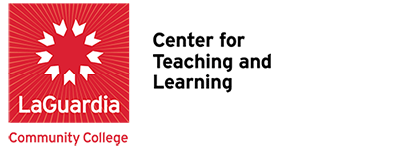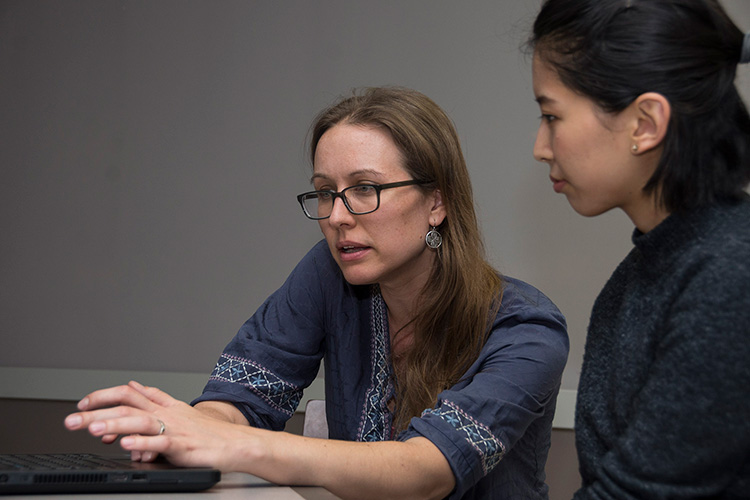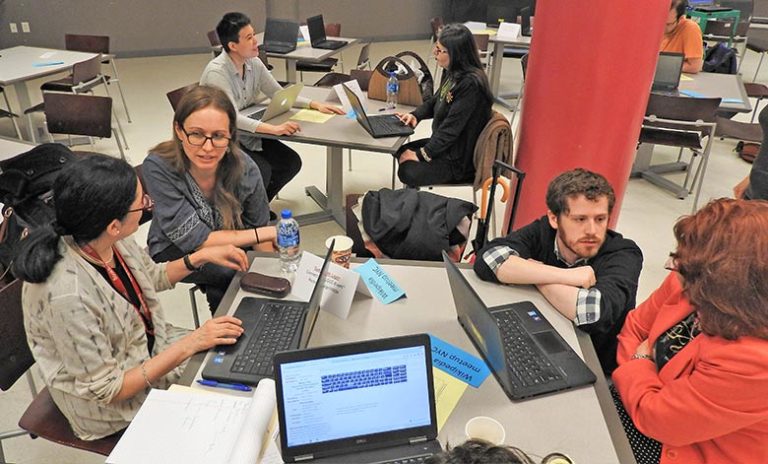One of my strong interests when arriving at LaGuardia was in finding new ways to connect the multilingual backgrounds of my students to their work in the classroom, which stems from my own experience working and teaching in a bilingual environment, and my training in the field of comparative literature. I spent my first couple of years making connections with people here who were doing interesting work related to multilingualism and translanguaging, a term which refers to how a person draws on all of their language resources for communication, using particular features as appropriate based on context, purpose, and audience.
As a result of this interest, I was excited to join my colleague in the English department, Dr. Ximena Gallardo, as she set out in the fall of 2017 to develop the first-ever Wikipedia translation event. Building on the model of the Wikipedia “edit-a-thon”, in which participants gather to edit Wikipedia articles on a specific topic, often with the support of a particular organization or institution like the Museum of Modern Art, the Translatathon is a two-day collective editing and translation event in which participants learn how Wikipedia works, how to edit, and how to translate Wikipedia articles from one language to another.
In our first two years, participants have worked in around 15-20 languages each time. As with edit-a-thons like the Art + Feminism series, the Translatathon allows participants to contribute to content areas that are not well-represented on Wikipedia, giving them a chance to think critically about how knowledge is distributed and to whom. It is precisely the depth and breadth of linguistic knowledge among LaGuardia students, faculty and staff which enabled us to spearhead this model, which has been taken up by groups in other cities, states, and continents!
The Translatathon allows me to support students in pursuing projects that interest them, while also working with organizations around the city to develop suggested topics and other activities for the event, giving me the chance to look outward at the way our work at LaGuardia impacts our community and the world beyond the classroom. Just as importantly, the first year-long Languages Across the Curriculum (LAC) seminar at the Center for Teaching and Learning, co-led by Dr. Lucy McNair and Dr. Leigh Garrison-Fletcher, helped me to re-focus some of my attention back to the classroom and on how these experiences might contribute meaningfully to student learning.
As a teacher of composition, I used what I learned in the LAC seminar to help students make deeper connections between their attitudes towards the languages they speak, and towards languages other than English in general, and the way they approach academic writing in English. Although I had some exposure to certain concepts and approaches from linguistics and the study of second language acquisition prior to the seminar, it really helped expand my knowledge of the research. It also introduced me to the myriad ways instructors in K-12 and higher education classrooms are engaging students’ entire range of linguistic skills to support their learning, as opposed to restricting them to only what they can express and learn in English, especially if it is a relatively new language for them.
Examples of strategies I learned in the seminar include a more insightful way to survey students’ language backgrounds at the start of the semester and a better approach to addressing the varying ways people think about grammar and standard English in my composition courses. In particular, I focused my attention on my English 102 (Writing through Literature) course. In addition to extending the composition skills students have begun to develop in English 101, this course aims to help students closely read and analyze literary texts. It is often a challenge for them to be able to write about the language choices an author makes and they often fall back on summary – a “book report” mode of writing.
During my time in the LAC seminar, I changed my syllabus to include more works written by multilingual writers, and/or writers who make use of different registers of English. We would then discuss how the authors use language strategically, and those strategies are more easily recognizable because students do many of these same things in their daily lives.
In addition, I asked students to record audio memos (short 3-5 minute responses to a set of prompts) on their smartphones or computers three times during the semester. The prompts asked them to reflect on how they use different languages and/or different registers of English strategically, respond to the strategies used by the authors we had been reading and their political implications, and reflect on how these authors’ use of language compared to their own expectations of what literary language and literary texts should be.
I found that because students did these recordings outside of class, they were comfortable not only talking about, but also using, a more informal, personal voice than they would normally use in a class discussion or low-stakes writing assignment. In the recordings, I encouraged them to just speak freely without preparation, and they often mentioned thinking of their languages in ways they had never done before.
Most exciting to me at the moment, perhaps, is how these two experiences have come together in my English 102 course, where I now assign students to research and write a contribution to a Wikipedia entry on one of our authors or texts from the class, after which they write a reflection on the process. Students have been very engaged by this assignment, and are particularly interested in learning about Wikipedia’s standards of reliability and the difficulty of synthesizing so much information into concise, easily-accessible prose. The contributions students wrote for the English-language Wikipedia in my spring and fall 2019 classes will hopefully be translated and perhaps even enhanced at this year’s Translatathon, on April 28th and 29th.




